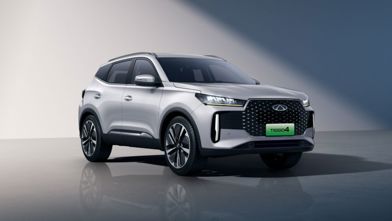MOTORSPORT IN REAR-VIEW AS IDEAS GURU LOOKS TO FUTURE
Alain Visser likes to stir things up. Sometimes that goes well, sometimes it doesn’t and that’s okay with him.
Visser is Volvo’s global senior vice-president marketing, sales and customer service. He spoke with Driven during a recent visit to Auckland to open the new Volvo Retail Experience showroom in Greenlane.
Visser’s current claim to fame is making the Forbes top 10 list of most influential chief marketing officers for 2014. Number one was Apple’s Phil Schiller, while others included marketing bosses from Ralph Lauren, Nike and General Electric. Definitely A-list stuff.
 Yes, Visser gets applauded for his unconventional thinking. He also gets the odd metaphorical punch, such as the passionate response to comments he made in Swedish newspaper Dagens Industri last year: basically, he suggested that Volvo and motorsport don’t really go together. One group of motorsport fans even started a Facebook page entitled “Alain Visser is a F***ing Idiot”.
Yes, Visser gets applauded for his unconventional thinking. He also gets the odd metaphorical punch, such as the passionate response to comments he made in Swedish newspaper Dagens Industri last year: basically, he suggested that Volvo and motorsport don’t really go together. One group of motorsport fans even started a Facebook page entitled “Alain Visser is a F***ing Idiot”.
So there are ups and downs as a global marketing boss. Luckily, Visser’s sense of humour is as sharp as his business sense.
Of the Forbes honour, he’s pleased but perplexed: “It doesn’t make sense to me, because car marketing is boring. Number one was the guy from Apple and they do really innovative things.
“In the car industry there is not much innovation. Everybody does television advertisements and maybe one is better than other, but that’s not innovation.
“The car industry is the most arrogant in the world. We say how quickly we move, but that’s b******t. I was at the Barcelona Mobile Congress recently; the mobile phone has evolved more in the last five years than the car in the last 50.”
Frustration with a staid industry and Volvo’s small size — it made just 465,000 cars last year, or around a quarter the volume of top premium brand BMW — has prompted Visser to do things differently. He says that typical Swedish traits such as simplicity and humility inform both Volvo product (such as the new XC90 crossover) and the marketing of the brand.
“We are a small brand with a small budget. So I have tried to implement this idea that if everybody else is doing something, we probably don’t need to.”
One of Visser’s more radical decisions was to abandon the treadmill of global motor shows and limit Volvo’s presence to one event in Europe, one in Asia and one in the United States each year. “You have to ask why everybody does motor shows. The answer is ... because everybody else does motor shows.”
 But it didn’t stop there: at last year’s high-profile Paris Motor Show, the brand displayed just one car on its 1500sq m stand. Naturally, it was the all-new XC90.
But it didn’t stop there: at last year’s high-profile Paris Motor Show, the brand displayed just one car on its 1500sq m stand. Naturally, it was the all-new XC90.
“I can tell you that there were some people in our own company that had doubts about that. My theory: this car is our jewel. When Cartier has a new ring it doesn’t display six of them in a row.”
What about that motorsport controversy? Well, for those who like fast Volvos, there’s some good news and some bad news.
The bad news is that Visser meant everything he said: “We are going to tune down our motorsport activities, although we will respect the contracts we already have. If you look at what our values are, there’s a dilemma between saying we are all about people and safety, and then having V8 racing cars going crazy around a circuit.
“ I get up in the middle of the night to watch the Japanese Grand Prix. I love it. But the thing you need to ask is does motorsport suit your brand philosophy? It’s easy to decide what you are going to do, but it’s difficult to decide what you are not going to do.”
 Volvo will exit the Scandinavian Touring Car Championship after next year. Closer to home, its contract with the Australian V8 Supercars series runs until 2016. Says Visser: “We have not made an announcement about that. But it’s very likely we will not go beyond that period.”
Volvo will exit the Scandinavian Touring Car Championship after next year. Closer to home, its contract with the Australian V8 Supercars series runs until 2016. Says Visser: “We have not made an announcement about that. But it’s very likely we will not go beyond that period.”
However, he agrees that having sporty road cars is crucial for any premium brand. Volvo’s tuning division is Polestar: “It’s important for us to have high performance cars, but we have to do it in a Volvo way. We have our Drive-E engines and hybrid technology. But there will be no V6s, V8s or big spoilers.”
Big decisions — but Visser maintains they are all made in Sweden, despite Volvo being owned by Chinese company Geely since 2010.
“You know, it annoys me a bit when I read so much more about Volvo-Geely than I do about Jaguar Land Rover-Tata. The impact of Geely on our business is very small. There is no process where decisions are checked in Shanghai.”
 Nor is there any direct Geely influence on Volvo product, says Visser: “The most important thing is that for the first time in a very long time, we are 100 per cent Volvo. The XC90 has a Volvo platform, Volvo powertrains, Volvo design and it’s built in Sweden. There is no more Ford heritage [Ford owned Volvo from 2000-10] and no Geely. The next new models will be the V90 and S90 and they are pure Volvo too.”
Nor is there any direct Geely influence on Volvo product, says Visser: “The most important thing is that for the first time in a very long time, we are 100 per cent Volvo. The XC90 has a Volvo platform, Volvo powertrains, Volvo design and it’s built in Sweden. There is no more Ford heritage [Ford owned Volvo from 2000-10] and no Geely. The next new models will be the V90 and S90 and they are pure Volvo too.”
Visser acknowledges that there will be technology transfer between the two companies as time goes on. For example, Volvo’s forthcoming new small-car platform, known as Compact Modular Architecture, will also be used for a Geely product in China.
“There is not and probably never will be any cannibalisation between Geely and Volvo buyers. But yes, that sharing will exist — that why you buy companies, to find those synergies.”
Safety will remain at the heart of everything: “It’s one of our biggest assets and something our German colleagues are envious of. We don’t make money from safety — we see it as our brand.”
Visser says the evolution of Volvo will be from a public perception of a Scandinavian/premium/safety brand to a true premium position with more emphasis on design and technology.
But perception can’t be changed without the product to back it up, says Visser: “Otherwise, marketing is just lipstick on a pig.”



